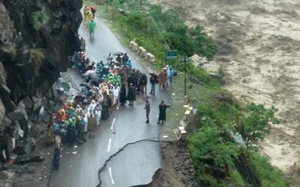 Dehradun, Jun 18: More than 30 people died and 57,000 pilgrims visiting the Badrinath, Kedarnath, Gangotri, and Yamunotri shrines were stranded in Rudraprayag, Chamoli and Uttarkashi districts on Monday as unprecedented rains wreaked havoc on Uttarakhand.
Dehradun, Jun 18: More than 30 people died and 57,000 pilgrims visiting the Badrinath, Kedarnath, Gangotri, and Yamunotri shrines were stranded in Rudraprayag, Chamoli and Uttarkashi districts on Monday as unprecedented rains wreaked havoc on Uttarakhand.
Rains also pounded Himachal Pradesh and several parts of Haryana, which were flooded after the level of the Yamuna rose alarmingly.
Reports from the Uttarakhand Disaster Management and Mitigation Centre said over 30 people died in rains, cloudbursts and landslips in Dehradun, Tehri, Rudraprayag, Chamoli and Uttarkashi districts.
According to reports received till Monday night, 19 persons have been severely injured, and seven have gone missing.
Anand Sharma, Director of the Meteorological Centre, Dehradun, said: “Dehradun on Monday morning registered a record rainfall of 340 mm. This amount of rain in June is seen almost after five decades.”
Mr. Sharma forecast landslips and heavy rains in the Kumaon region, and Rudraprayag, Chamoli and Uttarkashi districts.
According to the Central Water Commission, the water level in the Ganga had risen by 1 metre above the danger mark.
The Army, the Indo-Tibetan Border Police (ITBP), Border Security Force (BSF), Border Roads Organisation (BRO), and National Disaster Response Force (NDRF) are handling rescue operations.
Army and private helicopters have been kept ready.
The District Magistrates have informed Chief Minister Vijay Bahuguna that people residing along rivers have been shifted to relief camps.
Rudraprayag District Magistrate Neeraj Khairwal said Rambada was the worst-affected in the district.
Chamoli District Magistrate S.A. Murugesan said Govindghat, Tangadi, and Patal Ganga were affected. The Badrinath-Rishikesh road, the Chamoli- Virahi road and the Kedarnath-Gaurikund road were damaged.
In Uttarkashi, the Rishikesh-Yamunotri and Rishikesh- Gangotri highways were blocked at several places.
ITBP spokesman Deepak Pandey told The Hindu: “Around 300 victims have been accommodated in the ITBP camp at Joshimath and 350 at Joshimath Gurudwara.” “The ITBP personnel are clearing the blockage on the outskirts of Joshimath.”
Mr. Bahuguna said: “We have given all District Magistrates a free hand to deal with the situation. Our priority is to rescue the pilgrims…”
“All relief measures, including deployment of helicopters, are in place, but no relief services are able to reach the people as road links have snapped,” he said.
The Chief Minister said the extent of damage was not ascertained yet as information received by the government was only through helicopter surveillance. “I will be going to the Prime Minister this week to request for a flood control package for the State.”
PM’s assurance Prime Minister Manmohan Singh called up Mr. Bahuguna and assured him that the Centre would give the State all assistance. The annual Kailash Mansarovar Yatra has been stopped at Buddhi in Uttarakhand. The pilgrims have been accommodated at various locations, an ITBP officer said.





Comments
Add new comment